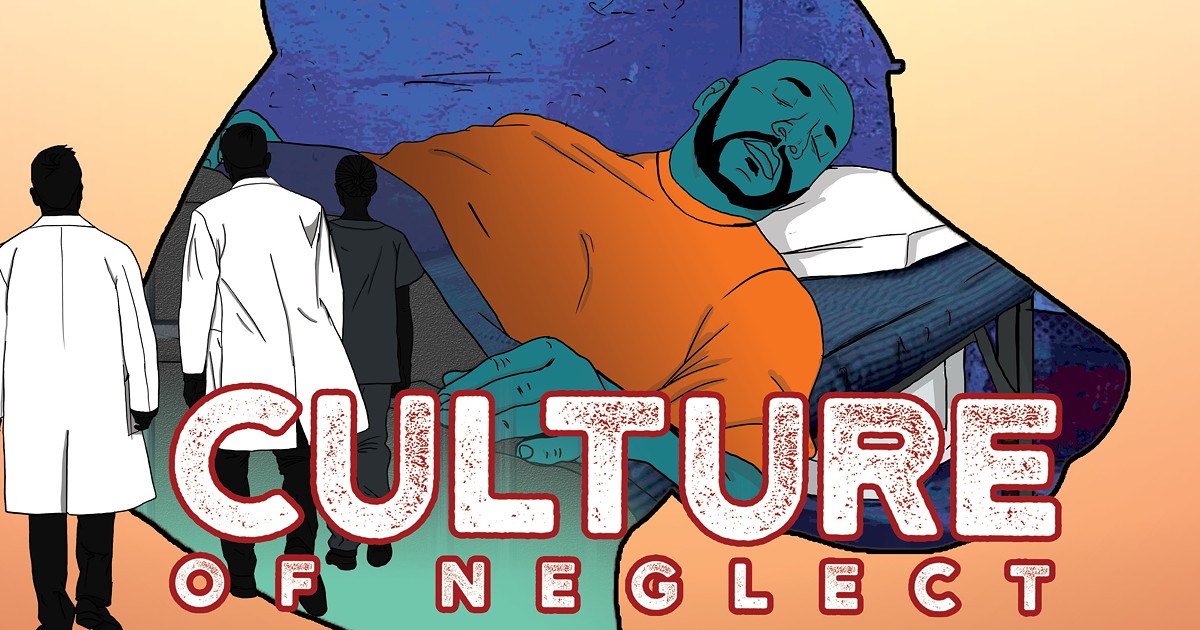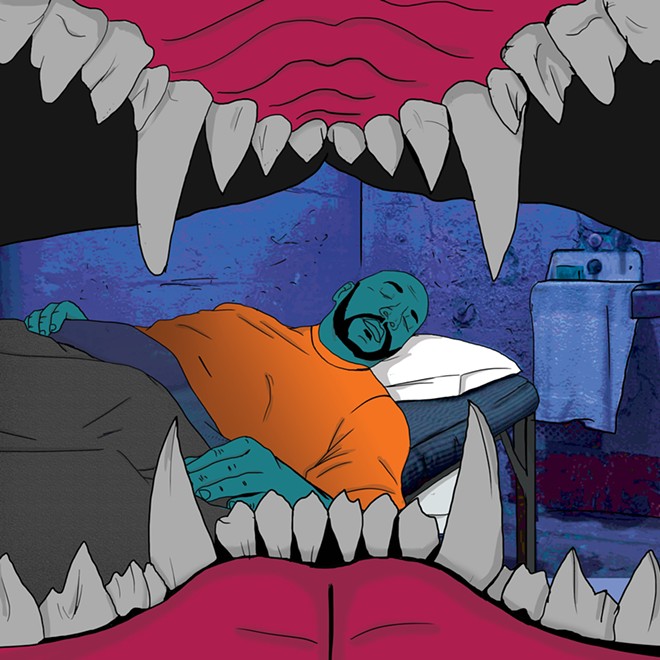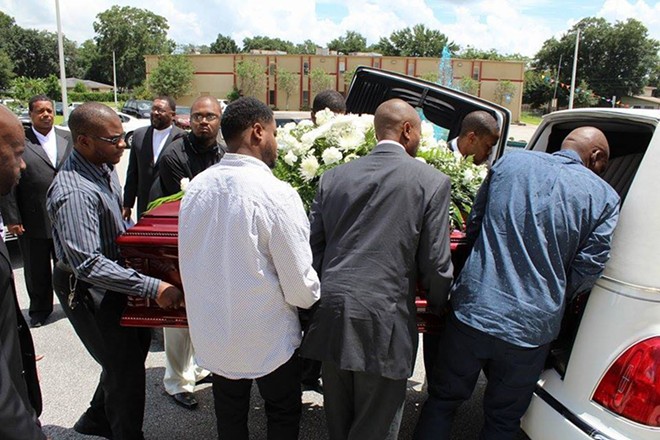Willine Gracia had been trying to keep her only son alive since he was 16.
That's when she sat Max Gracia down for their first come-to-Jesus talk. He wasn't doing anything wrong at the time – he was just black. At the time, they were living near Washington Shores, one of the predominantly African-American neighborhoods of West Orlando. As a single mother raising a son and a daughter, Willine was particularly worried about Max, texting and calling him multiple times a day to make sure he was safe. Born in New Jersey, he had grown up in neighborhoods where the police presence was less conspicuous, and his mother says he didn't understand at first the limitations in Orlando.
"I remember when I told him he had come home from a friend's house walking and didn't have a cellphone," she says. "I sat him down and I told him, 'You can't just go around here at night walking or on a bike. The police are going to stop you.' My son loved to debate everything, but I told him not to argue with them because he could get killed. You have to stay out of trouble because they don't play fair, and the system is not designed to work for you. There's nothing wrong with wanting to be out late like other young people, but as a black man, you can't do that in this area."
Two years ago at the beginning of August, his mother says she took a then-22-year- old Max to the courthouse to get his passport. He was supposed to leave for training in a couple of weeks for an airline that hired him.
It was the last time she saw him alive.
Days later, on Aug. 6, 2015, Max Gracia would be arrested by Orlando Police officers who accused him of robbing a Circle K convenience store with a gun. Gracia tried to escape by hiding in Lake Mann, but officers sent in a K9 after him. The police dog bit him multiple times before he was captured and taken to Orlando Regional Medical Center for treatment before being booked in the Orange County Jail. Willine Gracia says she didn't immediately go see her son because she was upset he was in trouble, but four days after his arrest, on Aug. 10, 2015, she went to the jail to put money in his account for food and to check on him – a friend had told her he was in pain. Detectives upended her life when they told her Gracia was dead, killed hours earlier by a fatal blood infection that stemmed from the dog bites.
After two years of searching for answers, Gracia's family filed a federal lawsuit with Orlando attorney Mark NeJame last week against Orange County, alleging a "culture of neglect" caused health staff to fail to provide adequate medical care for Gracia, ultimately leading to his death.
"I'll never know if he did [the robbery] because he's dead, and he's not here to defend himself," Willine Gracia says. "My son didn't hurt anyone. He hadn't been found guilty. Let's just say he did it – he should have gotten arrested, put in jail and had his day in court. Instead, he was in that jail screaming for help. Regardless of the charge or record, why was he being ignored?
"I don't know what happened with the robbery, and I don't care. My child shouldn't have died."
The timeline for the death of Max Gracia starts around 2:04 a.m. on Aug. 6, when Orlando Police officers were dispatched to a Circle K at 401 N. John Young Parkway in reference to an armed robbery. Minutes before, store employees alleged a suspect had walked into the store wearing a white cloth to cover his mouth and holding a beige bag, according to the arrest report.
The suspect told one of the store clerks, "Give me all the money," as he held a silver handgun at his waist. He then ordered the store clerk to open both cash registers and place the money in the beige bag. During the ordeal, store clerks remembered the suspect saying, "I'm sorry, but I got to do this," repeatedly, according to the report.
After he had the money, the suspect then bolted from the store, going east on John Young Parkway. Less than a mile away, officers tried to stop Gracia on Robinson Street, but he fled from them. Officers discovered him hiding in the waters of Lake Mann and sent in a police dog after him. The arrest report doesn't mention what the dogs did to Gracia, but according to the Orlando Sentinel, a separate report said he was "bitten multiple times on the inside and back of his upper left thigh." The arrest report says Gracia struck the dog several times and continued further into Lake Mann. After spending more than two hours in the lake, officers eventually arrived in a boat and took Gracia into custody on charges of robbery with a firearm based on victims' statements, resisting an officer and interfering with a police dog. He was taken to the Orlando Regional Medical Center for treatment and then booked into the Orange County jail.
The lawsuit says after Gracia was booked into the jail, he was seen by the medical director of the jail's corrections health services, Dr. Robert Buck III, for his injuries. Buck observed that Gracia had multiple severe dog bites and ordered Gracia be given Depakote for his seizure condition as well as pain medication and an antibiotic. Buck also noted that the jail's nursing staff needed to verify Gracia's HIV medication to see if he had been "compliant," and if so, place an order. However, the lawsuit alleges the HIV medication was never ordered for Gracia.
Through Aug. 7, nurses noted that Gracia was tolerating his medication and his wounds were being cleaned and dressed. On Aug. 8 at 5:13 p.m., the lawsuit alleges Gracia complained to nurses that he had vomited twice, and he was given medicine.
On Aug. 9 at 6:35 a.m., a nurse changed the dressing on the wound on the back of his left thigh and found it reddened, with a large amount of bloody drainage. A few hours later, nurses noted that Gracia was complaining of dizziness and weakness, and ordered him to increase fluids. Later that night, around 9 p.m., the lawsuit alleges one nurse documented that she saw Gracia twisting on the bed and moaning loudly, saying he "can't do it," and sliding to the floor. Before the hour was over, another nurse noted that Gracia "refused" to get up for his evening medication. Nurses also noted that Gracia refused to follow corrections officers' orders regarding a cell change and instead lay on the floor on his back "refusing all treatment." The Sentinel reports Gracia was punished and faced disciplinary action because the jail's nursing staff believed he was " 'faking or exaggerating the illness' and inability to get up."
On Aug. 10 around 5:15 a.m., a corrections officer told a nurse that Gracia was not breathing. The nurse found him lying flat on his back without a pulse or respiration. Nurses started doing CPR on Gracia until EMS arrived and took him back to the ORMC at 5:48 a.m. He was pronounced dead about 20 minutes later. The lawsuit alleges he was already dead in his prison cell before paramedics arrived.
An autopsy by the Orange County Medical Examiner's office later concluded his death was a result of septic shock complicating the infected dog bite wounds on his legs, with HIV as a contributory factor.
"Due to the fact that the death of this individual is a result of injuries sustained during efforts to subdue him as he resisted arrest, the manner of death is homicide," the autopsy states.
Orange County spokeswoman Carrie Proudfit says after Gracia's death, Orange County's Corrections Department launched a critical review process and internal investigations regarding "the care, custody and cause of death to determine if any appropriate actions need to be taken." During the investigations after Gracia's death, one nurse resigned, while two nurses were given reprimands. The jail's medical staff was also trained regarding the identification and initial treatment of sepsis and infirmary operating procedures that pertain to checking vital signs were updated.
The Orange-Osceola State Attorney's Office reviewed the investigation documents provided by law enforcement in the case of Gracia's death and decided not to file formal charges in June 2016, according to spokesperson Eryka Washington. That decision was made under the previous prosecutor, State Attorney Jeff Ashton, and Washington says that decision has not changed under the administration of State Attorney Aramis Ayala.
"The care and treatment provided to decedent from Aug. 6, 2015, to Aug. 10, 2015, while he was incarcerated at the OCC/CHS deviated from the acceptable medical and nursing standard of care and rose to the level of deliberate indifference," the lawsuit claims.
Proudfit says the county does not comment on pending litigation. Attorney Mark NeJame, who filed the lawsuit for the Gracia family in the U.S. District Court for the Middle District of Florida, says the family is suing for damages because they want to make positive changes at the Orange County jail so that this doesn't happen to another person.
"It makes no difference whether somebody is in jail for littering on the sidewalk or multiple murders," he says. "Once they're in the care or authority of the jail they are to be treated humanely and to be provided proper medical care. That was by all indications not done in [Gracia's] case, and all the more confirmed by the subsequent reprimand and resignation."
Regardless of what Gracia may have done, his medical care was constitutionally guaranteed under the Eighth Amendment, which bans cruel and unusual punishment, says Jacqueline Azis, an attorney for the American Civil Liberties Union of Florida.
"Jails and prisons must provide adequate medical care," she says. "It's unconstitutional to deny care to those in custody. It's important to know the right to medical care belongs to everyone in custody, from the most heinous crimes to those presumed innocent, as was the case with Max Gracia. There's always comments after these deaths about how 'they shouldn't have been running,' or 'they shouldn't have been doing that,' but what they're accused of doing is not important. What is important is the prohibition against cruel and unusual punishment."
Max Gracia's mother says she knows he wasn't the perfect kid.
He had gotten in trouble with the law before and gone to jail on various charges including aggravated assault with a deadly weapon, battery and a previous accusation of robbery at the same Circle K (though those charges were later dismissed). But Willine Gracia says that doesn't justify how her son was treated before his death.
"I want people to know that there were other times my son got arrested, and he was known in jail for having a prayer meeting every night for the cellmates on his floor," she says. "He used to call me and give me a list of inmate names for me to call their families because they don't have money on the phone. I'd put extra money in his account so he could buy himself food to keep up with his medication and he would buy enough stuff to feed everyone in his pod. That's just the type of person he was."
Willine Gracia remembers her son loved his three dogs and attended church faithfully. Max Gracia found laughter in everything and was the life of the party. The void left in her life has left her with sleeping problems, anxiety and panic attacks.
"I have to live day-by-day, because there's only so much I can take," she says. "For the first year, I couldn't even look at my son's picture. ... He was never found guilty and he was screaming saying he needed help. Why was he not heard? Police, doctors take oaths to protect and serve, and that's not what was done here. They killed my son."






















